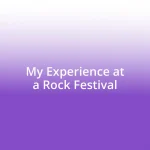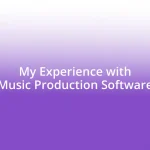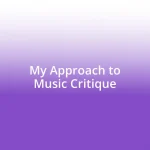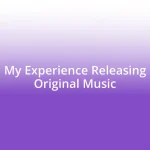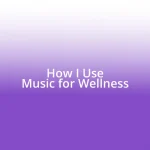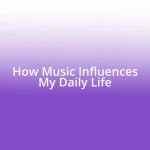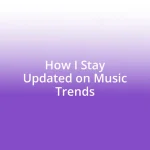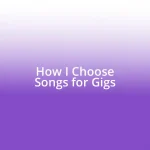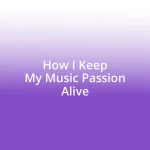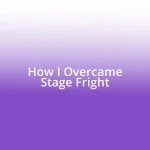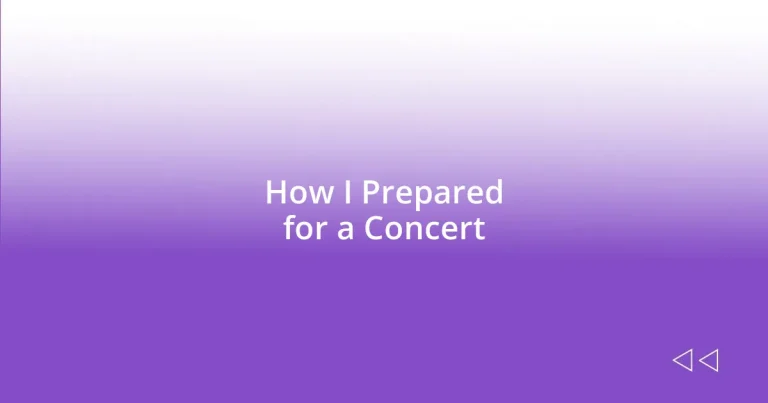Key takeaways:
- Setting clear concert goals enhances the overall experience and allows for deeper connections with the music.
- Designing a balanced rehearsal schedule with rest days leads to improved performance and mental clarity.
- Choosing the right setlist involves balancing audience engagement with personal expression and emotional flow.
- Post-concert reflection and feedback with bandmates are crucial for personal growth and future performance adjustments.
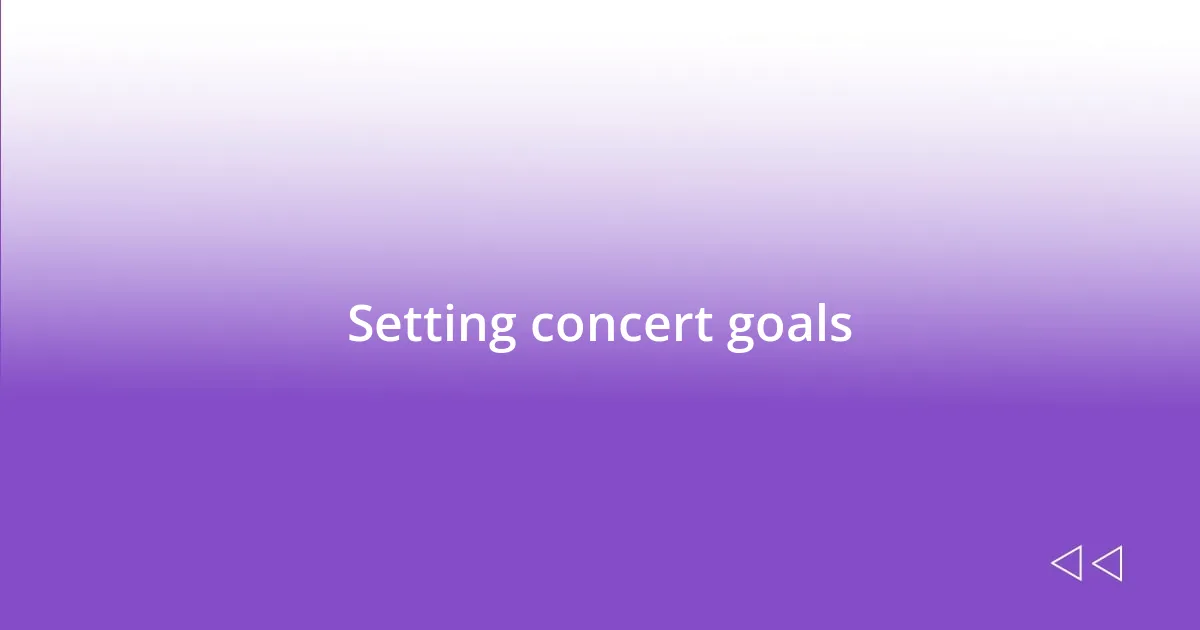
Setting concert goals
Setting concert goals is essential for not just surviving, but truly thriving in the experience. I remember the first concert I ever attended; I went in without any clear expectations. That night taught me the value of having goals—whether it’s capturing that perfect selfie with the band or just wanting to dance like no one’s watching. What do you hope to take away from your concert experience?
I often find that defining my concert goals transforms the event into something more meaningful. For instance, at my last show, I aimed to connect deeper with the music by really listening to the lyrics rather than just enjoying the beats. It made all the difference. Have you ever considered how setting specific intentions can change your perspective during a performance?
As I reflect on my concert experiences, I realize that sharing these goals with friends can elevate the whole adventure. Last summer, I attended a festival with fellow music lovers who each had something different they wanted to achieve—one friend wanted to meet new fans, while another was on a quest for rare merchandise. Knowing this added a layer of excitement to our adventure. What would you want to focus on with your concert crew?
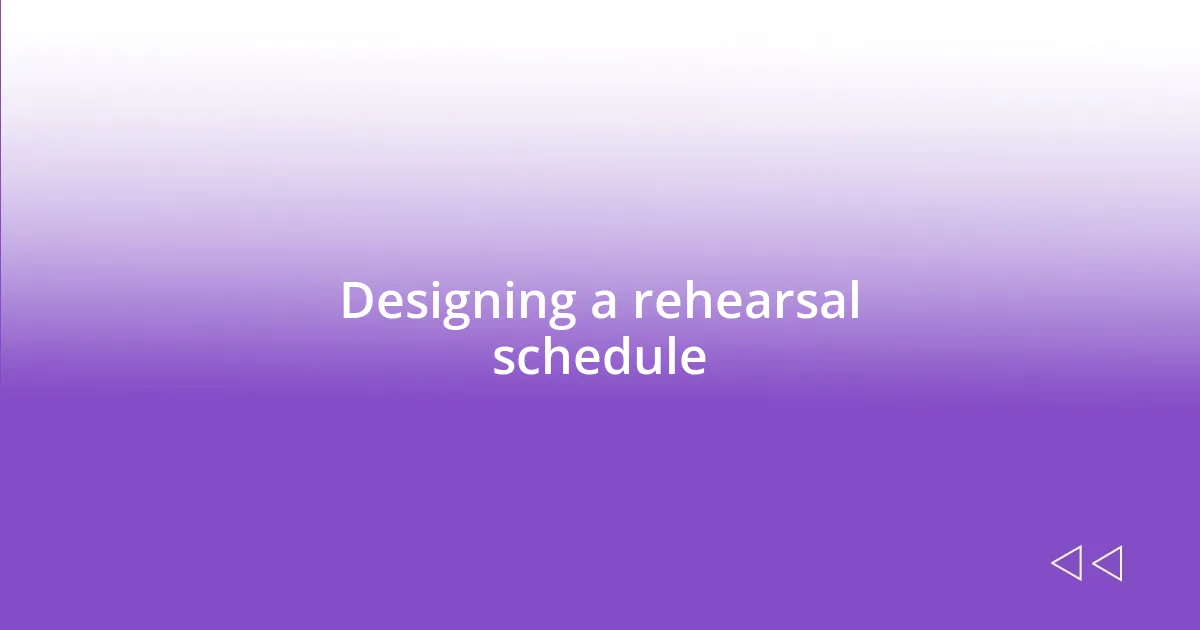
Designing a rehearsal schedule
When designing a rehearsal schedule, I’ve learned that balance is key. I remember a time when I crammed every song into a single week, only to feel burnt out by the performance day. It didn’t leave me room to breathe or refine my skills. I’ve found that spreading rehearsals over several weeks allows me to focus on the intricacies of each piece, ultimately enhancing my performance. How do you approach your practice routine?
Creating a structured yet flexible rehearsal schedule can be a game changer. I often start with a mix of full run-throughs and focused sessions on specific sections that need polishing. Early on, I noticed that if I dedicated certain days to practicing those challenging parts, I’d return to them later with a fresh perspective. Have you tried layering your practice in this way?
In my experience, it’s also crucial to allocate time for rest days within the schedule. When I first began my journey in music, I underestimated recovery. One memorable weekend, after back-to-back rehearsals, I found myself feeling disconnected from the music entirely. Since I began incorporating regular breaks, I’ve discovered that allowing my brain to rest often leads to breakthroughs during practice. How do you ensure you remain energized for your performances?
| Schedule Component | Description |
|---|---|
| Full Run-Throughs | Practice the entire set to simulate concert conditions. |
| Focused Section Practice | Spend dedicated time on challenging parts to improve precision. |
| Rest Days | Include breaks to allow for mental recovery and reflection. |
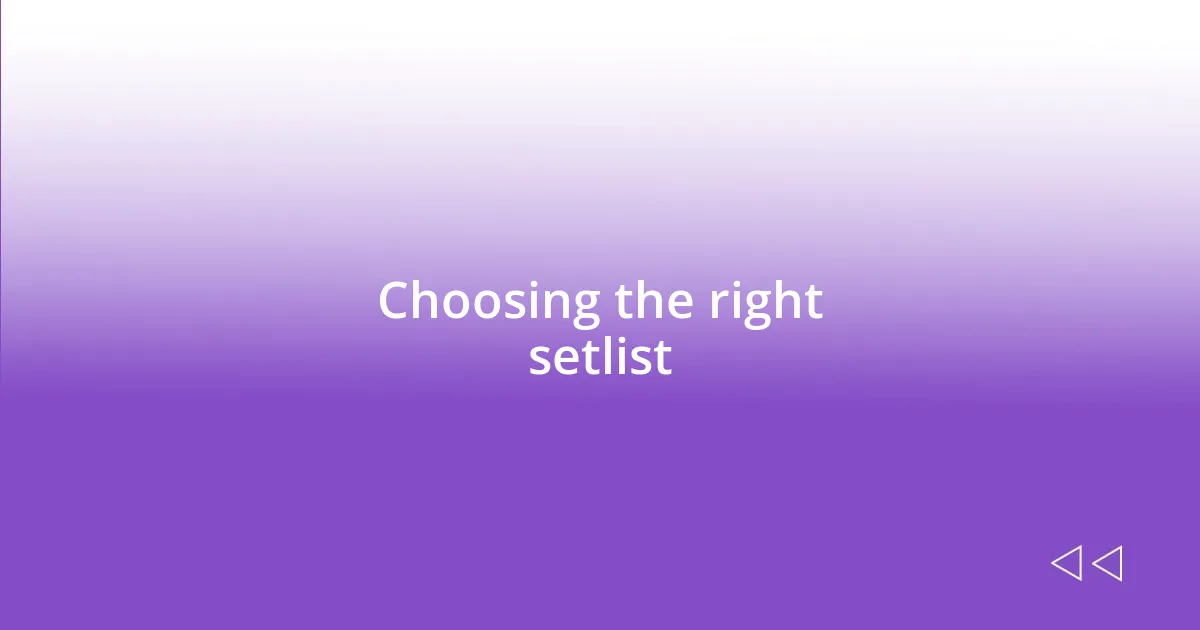
Choosing the right setlist
Choosing the right setlist can be one of the most exhilarating yet daunting parts of preparing for a concert. I remember the anticipation I felt when curating my setlist for a local gig. I wanted to craft an emotional journey for the audience, so I started by mixing hits that everyone could sing along to with deeper cuts that revealed my artistic side. It was all about striking a balance that kept people engaged while still showcasing my growth as a musician.
- Audience Energy: Consider what songs excite the crowd and create a lively atmosphere.
- Flow and Dynamics: Aim for a narrative arc, moving from high-energy songs to emotional ballads and back to anthems.
- Personal Connection: Include songs that resonate with you, allowing genuine expression that the audience can feel.
- Duration and Variety: Be mindful of the time limit; a well-paced set keeps listeners invested.
Through trial and error, I’ve learned the power of closing with a bang. On one occasion, I ended my set with an unexpected upbeat track that left everyone buzzing with energy and wanting more. That moment taught me just how impactful a carefully chosen setlist can be on both the performer and the audience.
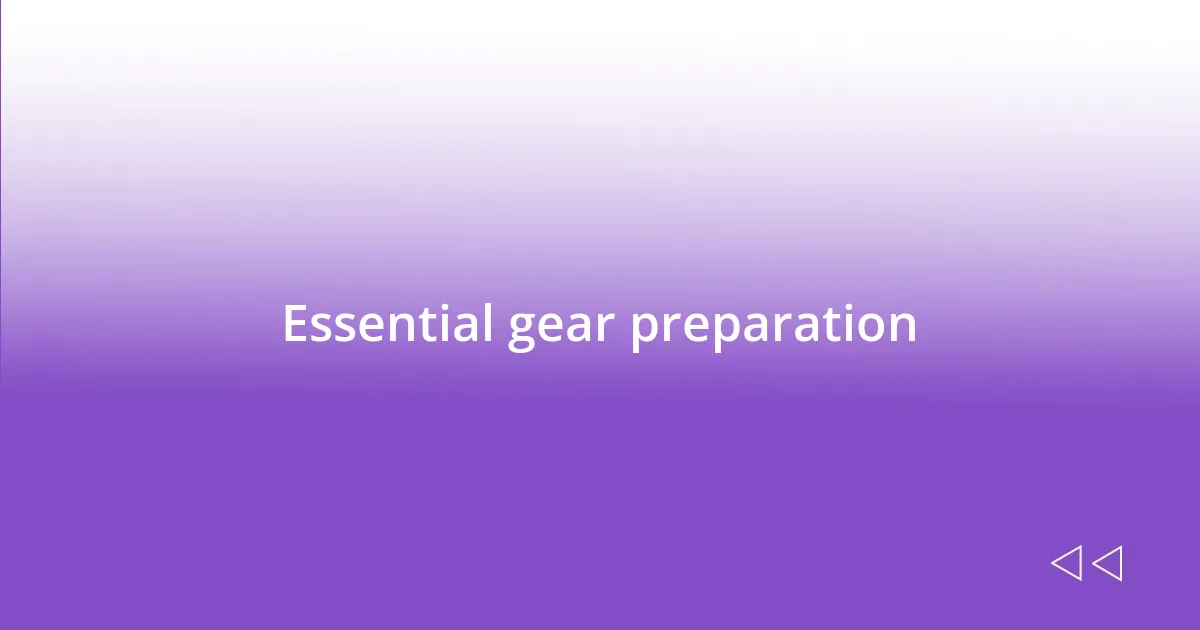
Essential gear preparation
When it comes to essential gear preparation, I’ve learned that it’s all about the specifics. I remember one concert when I forgot my favorite guitar pick, and my performance felt off from the start. Now, I make a checklist of everything I need, from instruments to cables. It’s the little things that can make or break a show, wouldn’t you agree?
In my experience, having a reliable backup gear is crucial. One time, my amplifier malfunctioned right before I was set to play. Thankfully, I had my backup amp with me, and it saved the day! I always pack duplicates of key pieces, ensuring I’m covered if something goes wrong. What do you do to prepare for unexpected mishaps?
Lastly, I can’t stress enough the importance of suitable clothing and comfort. I once wore a pair of boots that looked great but made it hard to move on stage. Now, I opt for outfits that reflect my style while allowing freedom of movement. It’s all about feeling good and looking the part while you perform. How do you choose your performance attire?
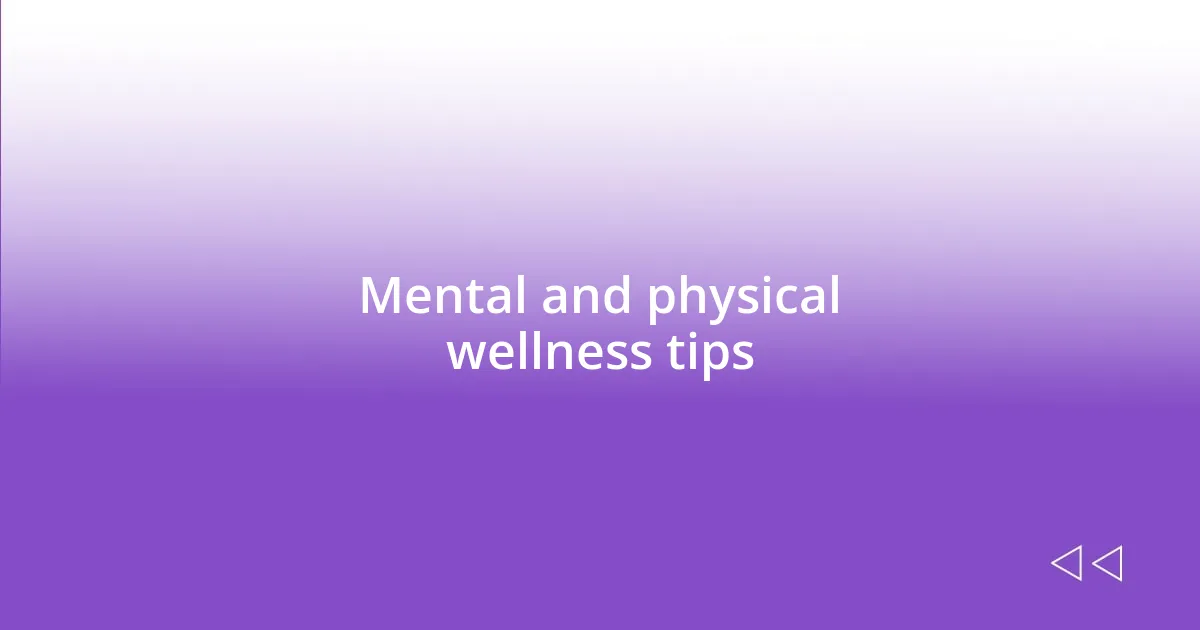
Mental and physical wellness tips
Taking care of mental and physical wellness before a concert is essential for a successful performance. In my experience, I’ve found that engaging in a brief mindfulness exercise helps clear my mind and center my thoughts. I often take a moment to close my eyes, focus on my breath, and visualize the energy I want to bring to the stage. It’s surprising how even a few minutes of this practice can diminish pre-show jitters and boost my confidence. Have you ever tried this approach?
Physical wellness matters just as much as mental, which is why I prioritize stretching and light exercise leading up to the gig. I remember a time when I rushed to the stage without warming up, and my body was stiff, making it harder to move and connect with the music. Now, I take a few moments to stretch my muscles and get my blood flowing, setting me up for a more dynamic performance. What techniques do you use to keep your body ready for action?
Lastly, I cannot emphasize the importance of hydration and nutrition as concert day approaches. On one occasion, I neglected my water intake, thinking I could power through with coffee alone. It was a mistake that left me feeling drained during the performance. Since then, I’ve made it a point to drink plenty of water and eat a balanced meal to sustain my energy levels. What’s your go-to snack before a show?
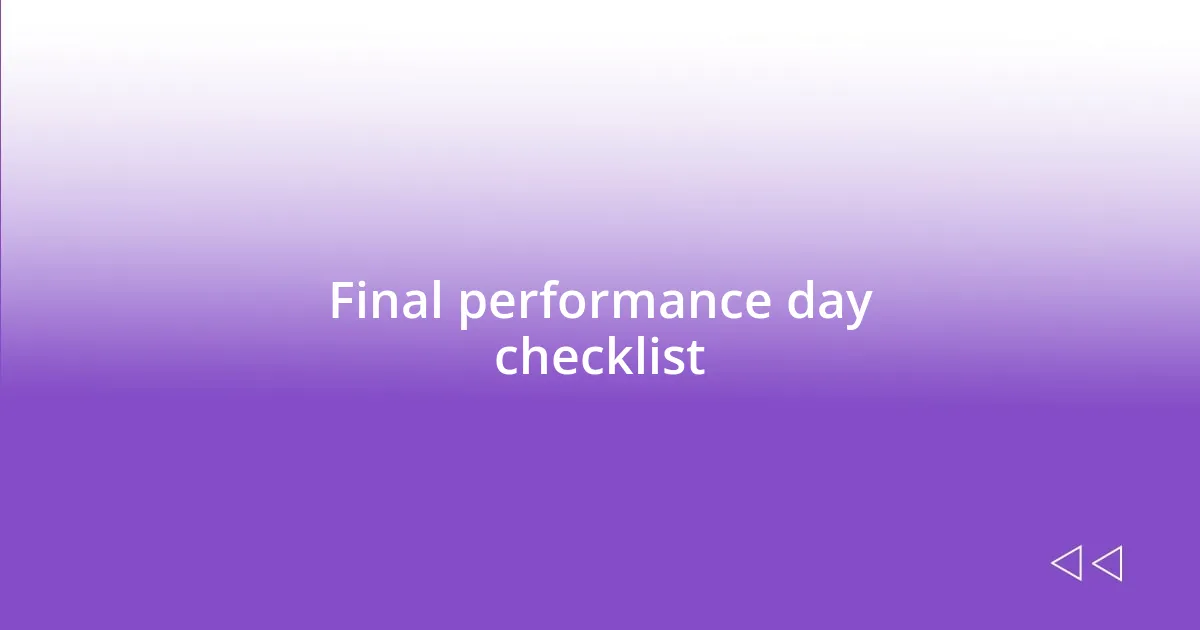
Final performance day checklist
I always start my final performance day checklist early in the morning. A few hours before the show, I double-check each item on my list, from my setlist to the snacks I’ll need to keep my energy up. There was this one time I forgot to bring my in-ear monitors, and let’s just say, the sound experience wasn’t the same. Now, I even have reminders set on my phone to make sure I don’t overlook anything important.
As the day progresses, I focus on setting a positive mindset. I try to practice my songs a couple of times in a relaxed setting, which helps me get into the groove. When I was preparing for a big show last year, I played my setlist quietly in my room, allowing me to feel the music without the pressure of being on stage. It felt like a warm-up and gave me the confidence boost I needed. Do you find that practicing in a calm environment helps you too?
Finally, I take a moment for a quick pep talk with myself. It might sound a bit cheesy, but I look in the mirror and remind myself of why I’m performing. One time, I actually wrote down my motivations and read them aloud before stepping onto the stage. Trust me, it made a significant difference in my mindset. What little rituals do you have to prepare for the spotlight?
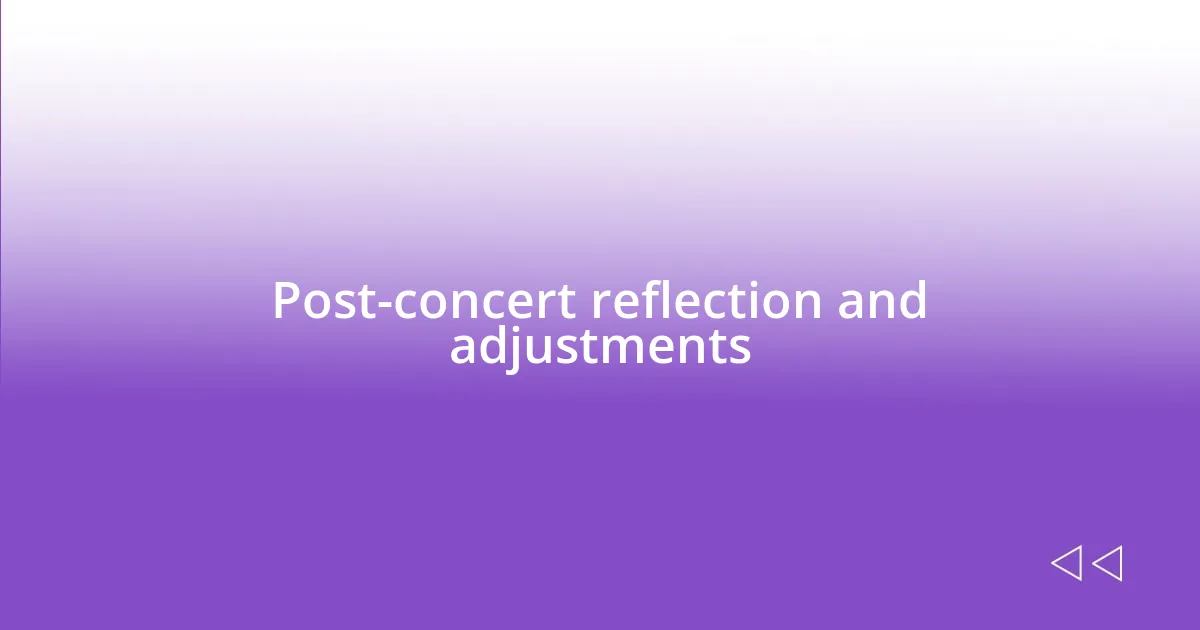
Post-concert reflection and adjustments
After the concert, I always take some time to reflect on my performance. I like to sit down with my thoughts, perhaps over a cup of tea, and really analyze what went well and what didn’t. There was that one show where I lost track of the tempo, and it threw me off for a few songs. Thinking back, I realized how being present in the moment could have helped. It’s a powerful reminder to always stay connected with the music during the performance. How do you process your experiences after stepping off stage?
I also believe that sharing feedback with my bandmates is crucial for growth. After a recent gig, we gathered in a cozy corner of the venue and had an honest discussion about our strengths and areas for improvement. It felt vulnerable but enlightening. I remember one of my friends pointed out how my energy levels shifted during certain songs and suggested ways to maintain that enthusiasm throughout the set. This kind of open dialogue fosters a supportive atmosphere. What’s your experience with receiving feedback?
Lastly, I make a list of adjustments for future performances. I find that jotting down insights right away helps solidify my learning. For instance, I once noted to work on my stage presence after I felt static during a slower song. Reflecting on where I struggled not only prepares me for my next gig but also reaffirms my commitment to evolving as an artist. Have you ever created a personal roadmap to guide your development?
